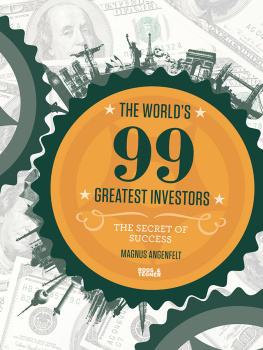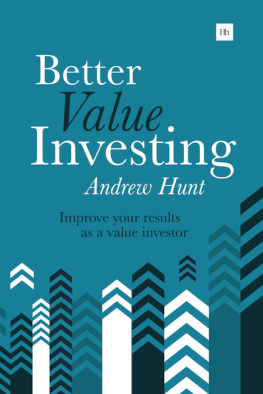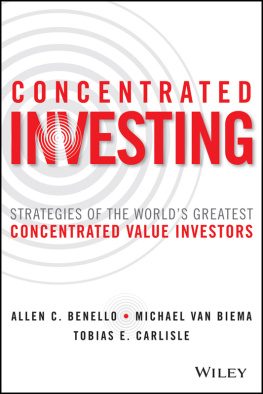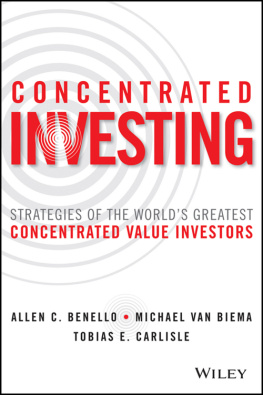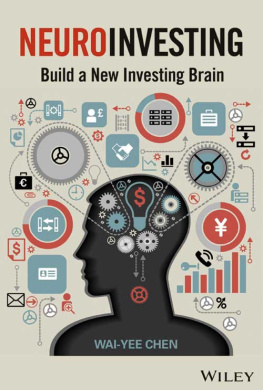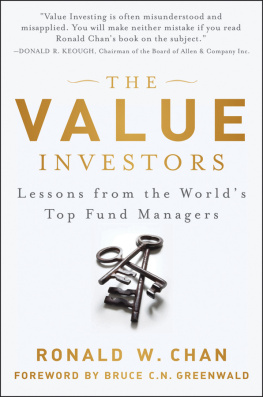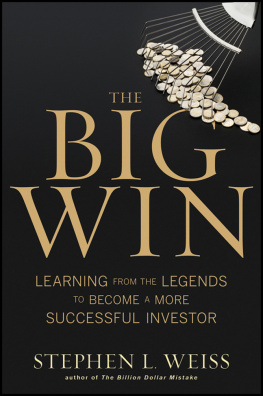
THE WORLDS 99 GREATEST INVESTORS
THE SECRET OF SUCCESS
THE WORLDS 99 GREATEST INVESTORS
THE SECRET OF SUCCESS
Magnus Angenfelt, 2014
Design: Benny Mrtensson
Author photo: Anders Roos
Editor: Brenda Sidemo and Erika Feldt
Translations: Charlotte Merton
ISBN: 978-91-86691-56-1
Roos & Tegnr
Monbijougatan 17 G
211 53 Malm
www.roostegner.se

TABLE OF CONTENTS
THE INVESTORS
The secret to success in any field is to find what successful people do, think about and act on, and do the same.
ANTHONY ROBBINS
FOREWORD
T he quote from Anthony Robbins on the previous page is a good description of my purpose with this book. Charlie Munger, Warren Buffetts legendary business partner, has said for his part that he is more interested in failures than successes. Like many people, I find my memory sometimes fails me, and when a familiar situation arises I dont want to misremember it and draw the wrong conclusions. That is why I stick to reading about the successful examples and analysing them.
If you share this kind of experience you will like this book. In the following pages you will read about the 99 best investors in the world. For each, there is a brief rsum of their investment philosophy and style (and yes, sadly there are only men), and they share their advice and insights garnered from at least 25 years of experience. Taken together, these men represent over 3,000 years of the most successful investment strategies of modern times. Yet the 99 have not limited themselves to advice on how to think and act when investing, for with experience and age comes a willingness to share wisdom about life in general. Even readers who are little interested in investing per se are likely to benefit from reading this book.
There are many books about the investment strategies that have worked best in the past. Computer simulations can pinpoint exactly when you should have bought and sold. There are just two small problems: the markets are constantly changing; and investors are individuals who have mental barriers, no matter how rational they say they are. This book is thus concerned with performance that is practically possible not just theoretically possible by flesh-and-blood investors. And I have to admit, it is a performance that goes far beyond impressive. You will not agree with everything; in fact, a great deal of it will go against the grain of your beliefs. Yet that is just as it should be, for there is no one-size-fits-all approach. The most important thing is to understand the way the most successful investors look at things. If you do that, you will be able to recognize the signs of market change, and can alter your compass bearing accordingly.
Whether a private or a professional investor, the hope is that you will improve your returns by reading the book. In particular, it has a great deal to offer private individuals. History scares people. Several different measurements from around the world show that a majority of individuals lose money on their investments, and do so quite unnecessarily. It seems more difficult to hold onto money than to earn it. Financial ignorance is expensive, and except for the US the school system tends to leave citizens in the lurch. That does not bode well for either individual or society.
On average, my chosen 99 investors outperformed the market by about twelve percentage points a year for 25 years. At the time of writing, they each manage an average of $10 billion. If they continue at this rate for another ten years, and the benchmark is zero, they will create an excess return of $1,206 billion to be distributed to clients, themselves, and as is very evident in this book charity. By comparison, according to the OECDs Development Assistance Committee, the total global aid budget in 2012 was $127 billion.
The objection to this kind of reasoning, according to many, is that the financial market is not alchemy. Investors cannot make money, they just grab a larger slice of the pie than others it is a zero-sum game. Yet that idea really doesnt hold water. It is not a zero-sum game for society. Fair enough, it is impossible to measure in exact terms the good investors can do, but with bad investors, for example, we might have had ten parallel railroads in each country and perhaps a hundred car manufacturers producing cars at significantly higher prices than today. Weak businesses and weak industrial structures would be supported overly long, and otherwise viable ventures would be starved of the necessary financing.
The most important factor, however, is that high performance encourages more capital to enter the financial market. Everyone who has money to invest, whether they are individuals, institutions, or companies, wants a good return on their assets. In this search for profits, it is the likes of the investors in this book who serve to funnel the capital flow to entrepreneurs, companies, and countries. The more intelligently money is managed, the better the worlds wheels spin.
Successful investors also encourage potential investors to venture into the game, which increases competition and thus, according to all economic theories, improves the outcome for the whole economy. Conversely, the fewer the investors who manage to deliver excess returns, the fewer new investors, which in turn leads to less risk capital and less yield, and so on.
Moreover, you will find evidence here that successful investors contribute to society in many ways. The media usually depict wealthier investors as scrooges, but while that might be an accurate description for some younger investors, both professionally and privately, the successful investors presented here give a completely different picture.
It was the famous German poet and playwright Bertolt Brecht who coined the phrase Erst kommt das Fressen, dann die Moral, Food first, then morality. However, most of the investors in this book are nothing like the caricature, in fact many of them give ample proof of an altruistic view of the world
Take only two quotes from the deeply religious Sir John Templeton, one of the most successful global investors in modern times: Measure success with a single word love, and, I think God supplies all of our needs if we are trying to help other people, so we do not need to be concerned about our own welfare. This is a million miles away from the popular metaphor of snakes in suits. Successful investors deserve respect for not throwing away clients savings on unworkable business models and instead investing the money where the return will be best for both clients and society; the worst investors deserve nothing of the sort.
Although I will question a range of economic theories, my aim here is not to arrive at any absolute truths. The purpose of this book is to learn from the best, which hopefully will result in even better investors. And that can only be good for the world.

Enjoy your read!
Magnus Angenfelt, Stockholm, December 2013
A PIECE OF CAKE
I t actually sounded pretty straightforward. Compile a list of the 99 best investors in the world, and ask them to share their key insights from their long and successful careers in the financial markets. Add a short summary describing each investors investment philosophy, plus a little light-hearted information about them.
Next page
